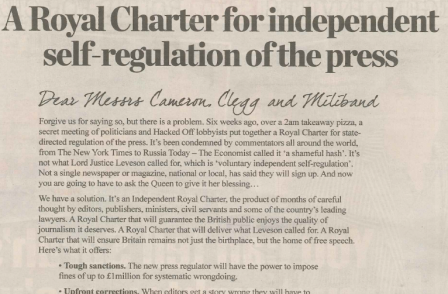
The national newspaper titles behind a rival Royal Charter for the regulation of the press today launched direct appeals to readers via full-page adverts and editorials.
The ad claims that the new press Royal Charter will ensure that Britain remains “not just the birthplace, but the home of free speech”.
The press plan will go to the Privy Council for consideration at its next meeting on 15 May alongside the existing Parliament-backed Royal Charter agreed in cross-party talks with Hacked Off and published on 18 March.
The two documents are based on the same original Royal Charter published by the Conservatives on 12 February.
While the cross-party Royal Charter sets out the terms of a regulator independent of both Parliament and the press – the press version gives the industry a member on the Recognition Panel which will oversee the new regulator. The press plan also removes an element of statutory underpinning by outlining conditions under which the Charter can be changed in future without approval from a two thirds majority in both houses of Parliament.
The press Royal Charter makes the creation of a libel-disputes arbitration panel for the regulator conditional on finding a way to do that which does not place undue strain on the regional press.
The Newspaper Society believes that its proposal will be compliant with the terms of an amendment to the Crime and Courts Bill which states that publications outside an approved industry regulator should be subject to the threat of exemplary damages in civil actions.
The press Royal Charter has the backing of the Newspaper Society, the Newspaper Publishers Association and the PPA.
Prime Minister David Cameron has indicated that he still has an open mind on the issue saying: “I am always very happy to look at other proposals.”
The Privy Council's own guidance on Royal Charters states: “Any proposal which is rendered controversial by a counter-petition is unlikely to succeed.” This could mean the Government could view a return to the negotiating table as preferable to forcing through its Royal Charter in the face of the press industry's rival petition.
The Privy Council is headed by the Queen and its meetings also include Lord President, deputy prime minister Nick Clegg, and three other Government ministers. Petitions for Royal Charters are normally approved or dismissed based on consultation with the relevant Government department.
The Newspaper Society, which has co-ordinated the rival Royal Charter, told Press Gazette that it does now intend to hold a public consultation on the document. This will be the first time that press owners have consulted with the general public on the future of press regulation.
The Guardian said today in an editorial: “What we need now is less of a Sunday-night stitch-up – or, indeed, a Thursday-lunchtime stun grenade – and more of a Good Friday agreement. Incredibly, since Leveson reported, there has not been a single meeting of press, politicians and other interested parties, including victims of newspaper intrusion. It may be they have more in common than they think.”
The Times, under former editor James Harding, had argued that self regulation of the press should be scrapped in favour of genuinely independent press regulation.
Today, The Times – in common with The Sun – published an editorial that was strongly in favour of the new press Royal Charter plan.
Harding was forced to resign as editor in December to be replaced by Sunday Times editor John Witherow.
The Times said in a leader column today: “The publication of an independent Royal Charter is an attempt in good faith to implement the Leveson report, introducing the toughest system of regulation in the Western world.”
Email pged@pressgazette.co.uk to point out mistakes, provide story tips or send in a letter for publication on our "Letters Page" blog

